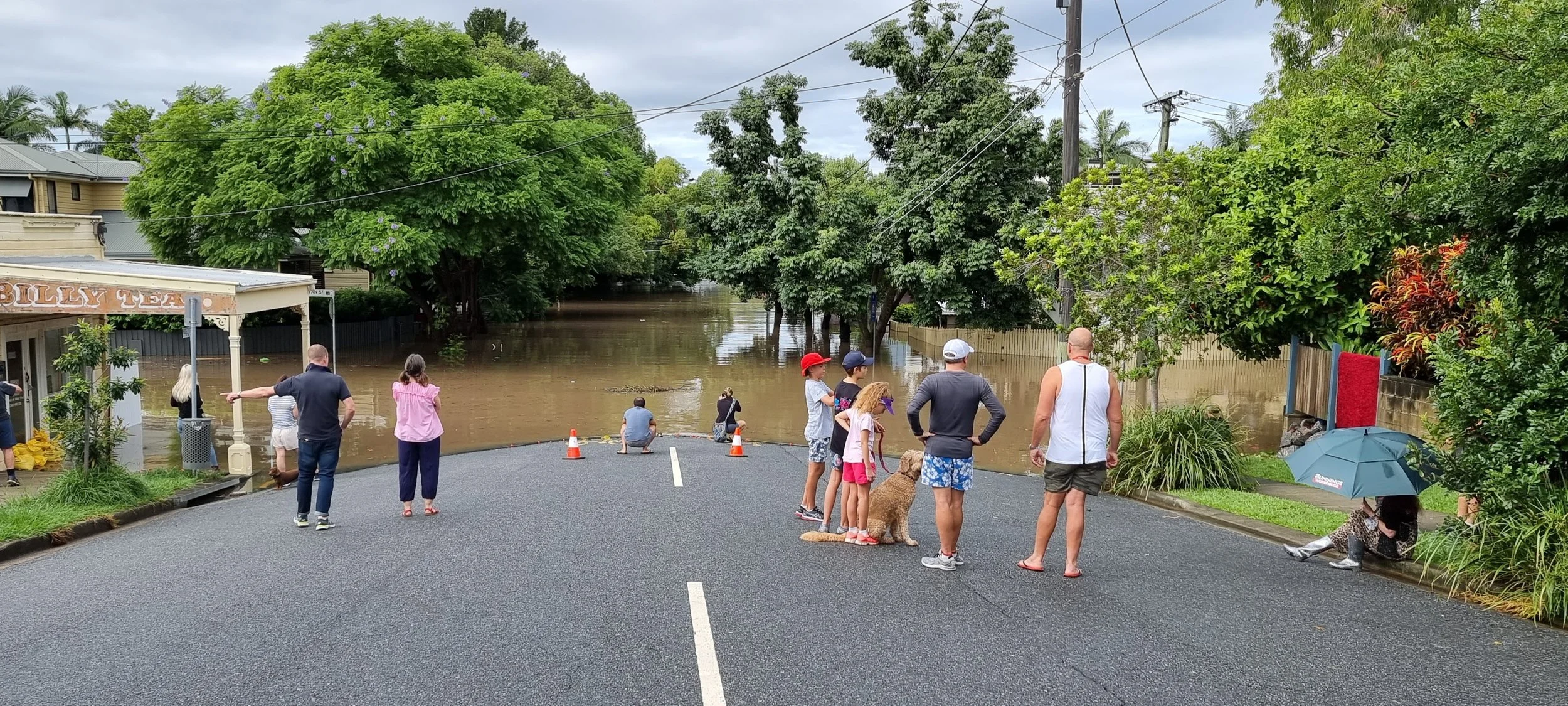Caring for Family During and After a Flood
6 May 2024
Image: Orleigh Street, West End, 1974.
My friend Paula was ten when the flood hit Brisbane in 1974.
As the water rose higher, her parents decided to send her and her siblings to relatives who lived on higher ground. Then they went back to the family home to monitor the flood water and protect what they could.
This seems like a sensible thing to do: get the kids to somewhere safe while you deal with the event as it unfolds. However, Paula says she spent the night terrified that her parents and the house would be washed away and she’d never see them again.
To this day, the sound of rain brings back that feeling of fear.
Image: People gather to watch the swelling river during the January 2011 floods Southbank Brisbane.
Dealing with a disaster and its aftermath is hard enough, but when you have a family to consider everything is more complicated.
Michelle Roberts is the director of the Australian Child and Adolescent Trauma Loss and Grief Network and is one of the leading experts in disaster recovery. She advises, where possible, to keep the family unit together.
“It’s very tempting,” she says in an Emerging Minds podcast, “to park the kids with trusted others like grandparents and aunts and uncles, but they need to be part of the recovery journey with you to shore up that family unit.”
That said, kids still need to be kept safe and have time to be kids. As one parent said, after the 2011 flood, “It was invaluable to have access to a kid-friendly friend’s house where my child could play and have fun all day with other kids. It meant we could get on with cleaning up and not have to expose him to the danger of the filthy house or the sight of it.”
This is fine as long as the child knows where you are, that you are safe, and when you will return.
A study performed after the Ash Wednesday bushfires found that “families who did not share their immediate reactions to the disaster (e.g. where children were sent elsewhere while parents focused on salvage work) were more likely to have trouble with their long-term adjustment”.
The key for families dealing with a disaster before, during and after, Michelle advises, is to talk. Involve the whole family in planning before an event so everyone knows what to expect and what they need to do.
“Talk about what the risks are, how they think they’ll respond to it, who’s going to do what, how are you going to do that, where are you going to meet if you’re separated.”
And for parents to effectively care for their children, they must make sure to care for themselves and their relationship. Michelle says children will worry about their parents if they think they aren’t okay, so it is important they take time to look after yourself. This can be as simple as sitting down for a cup of tea with a friend or relative, taking time to sit quietly and listen to some music or watch something pleasant.
Image: Hoogley Street, West End, 2022 Flood.
One of the best things a family can do to help deal with and recover from a disaster is to get back into a routine. This may sound easier said than done in the aftermath of a flood, but just sitting down to a meal together each evening can provide a sense of normality. It ensures that everyone is getting some nutrition, but also provides an opportunity to talk about how they feel and to plan their recovery. And it’s also important to have fun.
“Make time to spend time together as a family and do fun things. We lose fun after disasters. We forget how to laugh and a good belly laugh is such good therapy. Go somewhere, do things together, build the family unit again as a tight structure of doing things together and being together. Build the relationship with your partner, with each child, and with the family unit. And don't forget to look after yourself in that.”
What parents should not do is use alcohol or (non-prescription) drugs to cope, keep themselves busy as a way of avoiding or distracting themselves, withdraw from family and friends, or stop doing the things they enjoy. And they should not be afraid to accept help.
While most people will recover from a traumatic event without professional help, some will need to reach out. The time to do this is when:
communication in the family is breaking down
parents don’t understand their children’s (or each other’s) behaviour
things aren’t improving over time
a family member’s physical or emotional health is deteriorating
family members don’t enjoy being together.
Remember, many people will recover from a flood event with little or no changes to their mental health, but for those who continue to struggle there is no shame in asking for help, and to do so can be beneficial for the family as a whole.
Rose Lane is a freelance writer who has lived in Brisbane since 1985 and in 4101 since 2019. She has been a regular contributor to The Westender and was a Community Correspondent with ABC Radio Brisbane from 2014-2016. Her writing has appeared in The Guardian, The Big Issue, New Matilda and other publications.
Resources
Mental Health Interventions Following Disasters by Black Dog Institute
Family relationships after a disaster by Queensland Government
What families can do to look after themselves following a flood by Emerging Minds
Looking After Yourself and Your Family After Disaster by Red Cross




